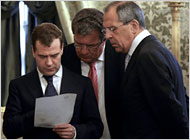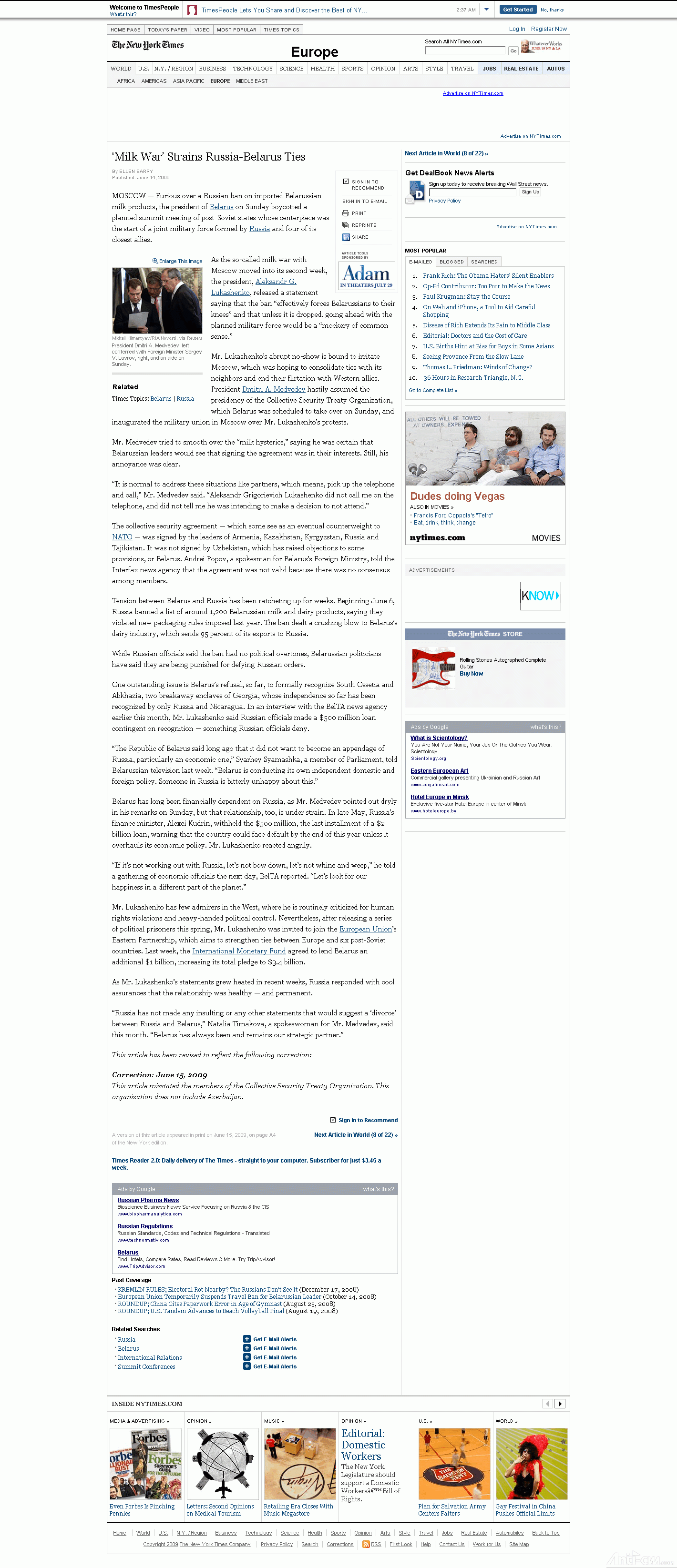|
|
‘Milk War’ Strains Russia-Belarus Ties
http://www.nytimes.com/2009/06/15/world/europe/15belarus.html?_r=1&ref=world
By ELLEN BARRY
Published: June 14, 2009

Mikhail Klimentyev/RIA Novosti, via Reuters
President Dmitri A. Medvedev, left, conferred with Foreign Minister Sergey V. Lavrov, right, and an aide on Sunday.
MOSCOW — Furious over a Russian ban on imported Belarussian milk products, the president of Belarus on Sunday boycotted a planned summit meeting of post-Soviet states whose centerpiece was the start of a joint military force formed by Russia and four of its closest allies.
As the so-called milk war with Moscow moved into its second week, the president, Aleksandr G. Lukashenko, released a statement saying that the ban “effectively forces Belarussians to their knees” and that unless it is dropped, going ahead with the planned military force would be a “mockery of common sense.”
Mr. Lukashenko’s abrupt no-show is bound to irritate Moscow, which was hoping to consolidate ties with its neighbors and end their flirtation with Western allies. President Dmitri A. Medvedev hastily assumed the presidency of the Collective Security Treaty Organization, which Belarus was scheduled to take over on Sunday, and inaugurated the military union in Moscow over Mr. Lukashenko’s protests.
Mr. Medvedev tried to smooth over the “milk hysterics,” saying he was certain that Belarussian leaders would see that signing the agreement was in their interests. Still, his annoyance was clear.
“It is normal to address these situations like partners, which means, pick up the telephone and call,” Mr. Medvedev said. “Aleksandr Grigorievich Lukashenko did not call me on the telephone, and did not tell me he was intending to make a decision to not attend.”
The collective security agreement — which some see as an eventual counterweight to NATO — was signed by the leaders of Armenia, Kazakhstan, Kyrgyzstan, Russia and Tajikistan. It was not signed by Uzbekistan, which has raised objections to some provisions, or Belarus. Andrei Popov, a spokesman for Belarus’s Foreign Ministry, told the Interfax news agency that the agreement was not valid because there was no consensus among members.
Tension between Belarus and Russia has been ratcheting up for weeks. Beginning June 6, Russia banned a list of around 1,200 Belarussian milk and dairy products, saying they violated new packaging rules imposed last year. The ban dealt a crushing blow to Belarus’s dairy industry, which sends 95 percent of its exports to Russia.
While Russian officials said the ban had no political overtones, Belarussian politicians have said they are being punished for defying Russian orders.
One outstanding issue is Belarus’s refusal, so far, to formally recognize South Ossetia and Abkhazia, two breakaway enclaves of Georgia, whose independence so far has been recognized by only Russia and Nicaragua. In an interview with the BelTA news agency earlier this month, Mr. Lukashenko said Russian officials made a $500 million loan contingent on recognition — something Russian officials deny.
“The Republic of Belarus said long ago that it did not want to become an appendage of Russia, particularly an economic one,” Syarhey Syamashka, a member of Parliament, told Belarussian television last week. “Belarus is conducting its own independent domestic and foreign policy. Someone in Russia is bitterly unhappy about this.”
Belarus has long been financially dependent on Russia, as Mr. Medvedev pointed out dryly in his remarks on Sunday, but that relationship, too, is under strain. In late May, Russia’s finance minister, Alexei Kudrin, withheld the $500 million, the last installment of a $2 billion loan, warning that the country could face default by the end of this year unless it overhauls its economic policy. Mr. Lukashenko reacted angrily.
“If it’s not working out with Russia, let’s not bow down, let’s not whine and weep,” he told a gathering of economic officials the next day, BelTA reported. “Let’s look for our happiness in a different part of the planet.”
Mr. Lukashenko has few admirers in the West, where he is routinely criticized for human rights violations and heavy-handed political control. Nevertheless, after releasing a series of political prisoners this spring, Mr. Lukashenko was invited to join the European Union’s Eastern Partnership, which aims to strengthen ties between Europe and six post-Soviet countries. Last week, the International Monetary Fund agreed to lend Belarus an additional $1 billion, increasing its total pledge to $3.4 billion.
As Mr. Lukashenko’s statements grew heated in recent weeks, Russia responded with cool assurances that the relationship was healthy — and permanent.
“Russia has not made any insulting or any other statements that would suggest a ‘divorce’ between Russia and Belarus,” Natalia Timakova, a spokeswoman for Mr. Medvedev, said this month. “Belarus has always been and remains our strategic partner.”

|
Milk, Strains, ties, war, 纽约时报, Milk, Strains, ties, war, 纽约时报, Milk, Strains, ties, war, 纽约时报
|